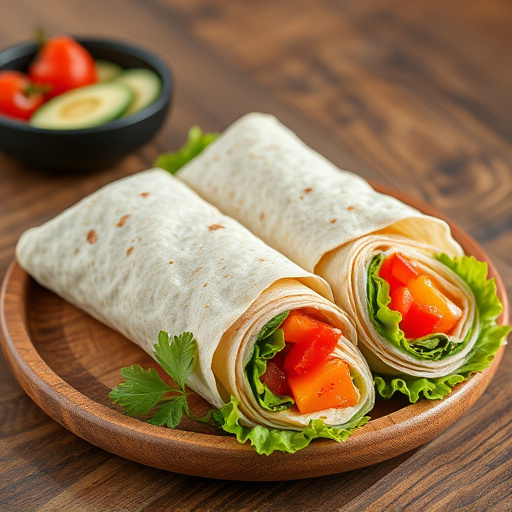Mastering Last-Minute Catering: Solving Outdoor Event Challenges
Planning an outdoor event on short notice? Don't panic! While last-minute catering can be a cha…….
Welcome to an in-depth exploration of a dynamic and ever-evolving sector within the food industry—Last Minute Catering. This article aims to guide you through the intricate world of on-demand catering services, revealing its historical roots, global impact, economic implications, technological transformations, regulatory landscape, and future potential. By delving into these aspects, we will uncover the significance of last-minute catering in today’s fast-paced culinary scene and equip readers with valuable insights for navigating this specialized field.
Definition: Last minute catering refers to the provision of food services and catering arrangements made within a short timeframe, often with less than 24 hours’ notice. It involves rapid response, flexibility, and the ability to cater to diverse events and gatherings on short notice.
Core Components:
Rapid Response: The cornerstone of last-minute catering is its speed. Caterers must be prepared to swing into action swiftly, ensuring quick turnaround times from inquiry to delivery.
Menu Customization: Given the urgency, caterers offer tailored menus that cater to specific tastes, dietary restrictions, and event themes. This customization ensures client satisfaction despite limited preparation time.
Logistics Management: Efficient logistics are critical. Caterers coordinate delivery routes, equipment rental, staff scheduling, and setup to ensure seamless execution of events.
Event Variety: Last-minute catering services span various occasions, from small intimate gatherings to large-scale corporate events, weddings, and festivals. This diversity requires caterers to be adaptable and versatile.
Historical Context: Historically, the concept of last-minute catering emerged as a response to the increasing demand for flexible food solutions in an on-the-go society. With modern lifestyles and the rise of impromptu events, the need for prompt culinary services gained traction. Over time, this niche evolved into a specialized industry, with caterers refining their practices to meet the challenges and opportunities presented by tight deadlines.
Last minute catering has left an indelible mark on the global foodservice industry, shaping dining experiences worldwide:
North America: The United States and Canada have seen a surge in last-minute catering services, particularly in urban centers like New York, Los Angeles, and Toronto. This trend is fueled by the fast-paced nature of these metropolitan areas, where residents often plan social gatherings and corporate events at short notice.
Europe: In Europe, countries like the UK, France, and Germany have embraced last-minute catering, with online platforms playing a pivotal role in connecting caterers with clients. The trend reflects the continent’s dynamic culinary scene and diverse event preferences.
Asia Pacific: Rapid urbanization and a growing middle class in countries like China, Japan, and Australia have contributed to the popularity of last-minute catering services. Mobile applications and digital marketing have further accelerated this trend, making it easier for clients to access caterers on short notice.
Trends Shaping the Industry:
| Trend | Impact | Example |
|---|---|---|
| Digital Platforms | Streamlined access to caterers, client reviews, and instant booking. | Apps like Cater2.me and Eventbrite enable users to find and book catering services with ease. |
| Sustainable Options | Rising demand for eco-friendly and locally sourced food. | Many last-minute caterers now offer plant-based menus, compostable packaging, and support for sustainable practices. |
| Personalization | Tailored experiences for clients’ unique tastes and preferences. | Caterers create custom menus featuring regional specialties or client-preferred cuisines to make every event memorable. |
| Technology Integration | Improved inventory management, staff communication, and real-time updates. | Some caterers use digital tools for efficient order tracking, allowing clients to monitor progress on their events. |
The last-minute catering industry is a significant contributor to global economic systems, with several key economic aspects at play:
Market Dynamics: The market is characterized by high competition and dynamic pricing. Caterers often set prices based on factors like menu complexity, location, event size, and urgency. Online platforms have democratized access to catering services, increasing consumer choice.
Investment Patterns: Initial setup costs for caterers include equipment, vehicles, staff training, and marketing. Many caterers start as small businesses, leveraging personal connections and local networks to gain traction. As they grow, investments in technology, expansion of service areas, and hiring specialized staff become crucial.
Economic Impact: Last-minute catering services generate substantial revenue for the foodservice industry and support related sectors like event planning, venue management, and entertainment. They contribute to employment opportunities, especially in hospitality and logistics.
Role in Economic Systems: These services cater to both domestic and international tourists, boosting local economies during events like festivals and conferences. They also facilitate business meetings and social gatherings, fostering connections and driving economic growth.
Technology has been a game-changer for the last-minute catering industry, revolutionizing operations and enhancing customer experiences:
Online Booking Platforms: The advent of digital platforms has simplified the booking process, allowing clients to search, compare, and book caterers in minutes. These platforms provide real-time availability updates, client reviews, and secure payment gateways.
Mobile Applications: Dedicated apps offer on-the-go access to catering services, enabling users to customize orders, track deliveries, and receive recommendations based on preferences. Apps like Zomato and Uber Eats have made last-minute catering more accessible than ever.
Inventory Management Software: Caterers use digital tools for efficient inventory tracking, reducing food waste and ensuring fresh supplies. These systems provide real-time insights into stock levels, helping caterers make data-driven decisions.
Data Analytics: Advanced analytics help caterers understand client preferences, optimize menu offerings, and predict demand. By analyzing booking patterns and customer feedback, they can refine their services accordingly.
Future Potential:
Artificial Intelligence (AI): AI chatbots and virtual assistants could enhance client interaction, providing personalized recommendations and 24/7 support.
Augmented Reality (AR) Menu Experience: AR technology can offer interactive menu options, allowing clients to visualize dishes and customize their orders virtually.
Blockchain for Transparency: Implementing blockchain technology can ensure food safety, traceability, and transparency in supply chains, building client trust.
The last-minute catering industry operates within a framework of policies and regulations that vary across regions:
Health and Safety Standards: Caterers must adhere to strict food safety regulations, including proper handling, storage, and preparation of food. These standards ensure the health and well-being of consumers.
Licensing and Permits: Operating licenses, food service permits, and health inspections are mandatory in most jurisdictions. These ensure that caterers meet legal requirements and maintain high standards.
Tax Obligations: Caterers are subject to various taxes, including sales tax, value-added tax (VAT), and employer taxes. Compliance with tax regulations is essential for legal operation.
Labor Laws: Employing and managing staff is subject to labor laws, which dictate minimum wage, working hours, and employee benefits. These regulations ensure fair treatment of catering professionals.
Regulatory Bodies and Their Influence:
| Region | Regulatory Body | Key Focus |
|---|---|---|
| USA | Food and Drug Administration (FDA) | Food safety, sanitation, and labeling standards. |
| UK | Food Standards Agency (FSA) | Ensuring food safety, promoting public health, and consumer protection. |
| EU | European Food Safety Authority (EFSA) | Setting science-based standards and guidelines for food safety across Europe. |
| Australia | Australian Competition and Consumer Commission (ACCC) | Enforcing competition, consumer protection, and fair trading practices in the catering industry. |
Despite its growth and technological advancements, the last-minute catering industry faces several challenges and criticisms:
Quality Control: Ensuring consistent food quality on short notice can be challenging, especially with high demand. Caterers must maintain rigorous standards to satisfy clients.
Staffing Issues: Finding and training staff willing to work on short notice is a recurring problem. Caterers rely on temporary workers or specialized staffing agencies to meet event demands.
Supply Chain Disruptions: Sudden changes in ingredient availability or supplier issues can disrupt catering plans. Efficient inventory management and diverse supplier networks are crucial solutions.
Environmental Concerns: The industry’s reliance on single-use packaging and food waste raises environmental flags. Adopting sustainable practices and promoting eco-friendly alternatives can help mitigate these issues.
Proposed Solutions:
Standardized Quality Protocols: Developing industry-wide quality standards and certification programs can ensure consistent food quality.
Training Programs: Investing in staff training, especially for temporary workers, can enhance service delivery and client satisfaction.
Diverse Supplier Partnerships: Building robust networks of local suppliers and distributors ensures a stable food supply, reducing disruption risks.
Sustainability Initiatives: Implementing eco-friendly practices, such as compostable packaging and sustainable sourcing, can address environmental concerns.
Situation: A leading tech company hosted a large-scale employee appreciation event during a major industry conference in San Francisco. They required a caterer who could provide gourmet food options on short notice while accommodating dietary restrictions for hundreds of attendees.
Solution: The company engaged a specialized last-minute catering service known for its innovative menu concepts and flexible logistics. The caterer conducted a thorough dietary assessment, designed custom menus, and ensured efficient setup and cleanup at the event venue.
Outcome: The event was a success, with employees enjoying diverse food options that catered to their preferences. The swift response and personalized approach by the catering team left a positive impression on attendees and company executives. This case highlights the importance of menu customization and timely delivery in corporate events.
Challenge: A couple planning a destination wedding in Greece sought an eco-conscious caterer who could provide local, seasonal ingredients while minimizing waste for their 150 guests.
Solution: They partnered with a local last-minute catering company renowned for its sustainable practices. The caterer sourced fresh produce from nearby farmers, used compostable servingware, and designed a menu featuring traditional Greek dishes with a modern twist.
Impact: The wedding was a testament to the couple’s commitment to sustainability, as guests praised the delicious food and eco-friendly presentation. This case demonstrates how last-minute caterers can embrace sustainable practices while delivering exceptional experiences.
Scenario: A music festival organizer in Australia needed a reliable catering partner who could provide multiple food options and handle large-scale events with rapid changes in guest numbers.
Strategy: The festival management engaged a dynamic last-minute catering service known for its ability to adapt to evolving event needs. They offered diverse food concepts, including vegetarian, vegan, and gluten-free options, and utilized digital platforms for efficient order management.
Result: The caterer successfully fed thousands of festival-goers daily, ensuring smooth operations and positive guest experiences. This collaboration exemplifies the industry’s ability to adapt and scale services for high-profile events.
The last-minute catering industry is poised for continued growth and innovation, with several potential developments shaping its future:
Sustainable and Ethical Practices: Growing consumer awareness of environmental issues will drive the demand for eco-friendly catering services. Caterers who adopt sustainable sourcing, packaging, and waste reduction strategies will gain a competitive edge.
Personalized Experiences: Customization will remain a key trend, with caterers offering tailored menus based on client preferences, dietary restrictions, and cultural backgrounds. AR technology could enhance this experience further.
Technology Integration: AI chatbots, smart inventory management systems, and data analytics will continue to transform operations, improving efficiency and client interactions.
Global Expansion: With increasing globalization and travel, last-minute catering services are expected to expand internationally, catering to diverse cultural tastes and events worldwide.
Last minute catering is a dynamic and ever-evolving sector within the culinary landscape, adapting to modern lifestyles and shifting consumer preferences. From its humble beginnings as a response to impromptu gatherings to becoming a specialized industry, it has left an indelible mark on global foodservice trends. This article has explored various facets of last-minute catering, from its historical roots to technological advancements and regulatory considerations.
The industry’s potential is vast, with opportunities for growth in sustainable practices, personalized experiences, and technology integration. As the world continues to embrace dynamic lifestyles, last-minute catering services will remain essential, ensuring that people worldwide can enjoy delicious food, regardless of time constraints or event scale.
By understanding the intricacies of this industry, caterers, clients, and stakeholders can navigate its complexities, capitalize on its potential, and contribute to its continued development and success.
Q: How do I find reliable last-minute catering services?
A: Utilize online platforms or request referrals from event planners or venue managers. Check client reviews and compare menu options, pricing, and customer service to ensure reliability.
Q: Can last-minute caterers accommodate special dietary needs?
A: Absolutely! Many caterers specialize in catering to diverse dietary preferences, including vegetarian, vegan, gluten-free, and other specific requirements. Customized menus are a standard feature of their services.
Q: What happens if my event is cancelled or postponed?
A: Most caterers have flexible policies regarding cancellations or changes in event details. Review the terms and conditions when booking, and communicate any changes promptly to avoid penalties.
Q: How do I ensure food quality on short notice?
A: Reputable caterers prioritize quality control through rigorous kitchen standards, staff training, and regular health inspections. Prompt communication and clear expectations regarding food preferences also help ensure a positive experience.
Q: Are last-minute catering services more expensive?
A: While some factors can contribute to higher costs, such as urgent preparations or specialized menus, not all last-minute caterers are significantly pricier. Competitive pricing is common, especially when comparing like services and options.

Last-minute catering presents caterers with challenges that demand agility, adaptability, and creati…….

Last-minute catering services are essential for unexpected events, providing both grab-and-go option…….

The current state of the art serves as a starting point for achieving desired results, emphasizing d…….